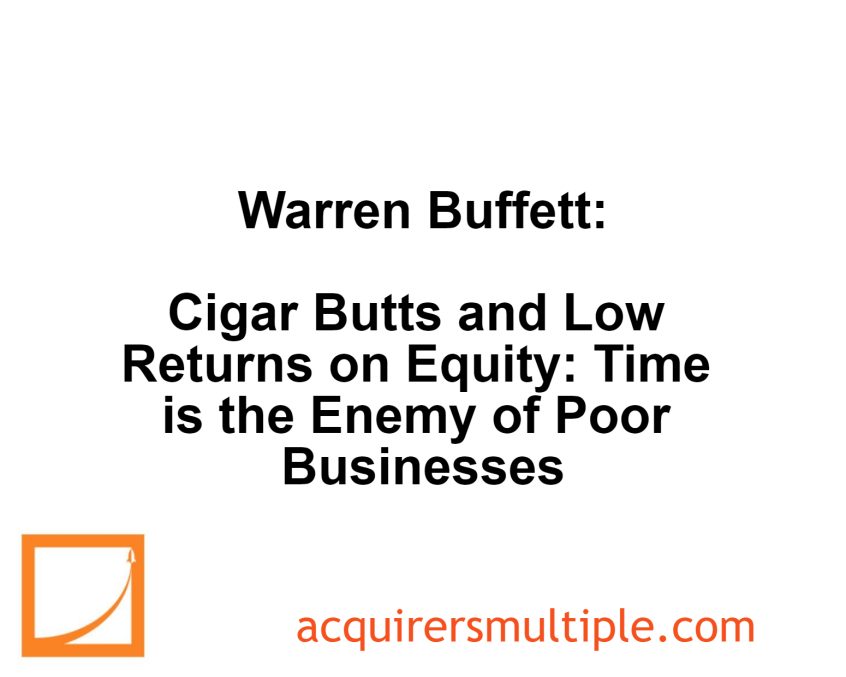During the 1998 Berkshire Hathaway Annual Meeting, Warren Buffett explained why he gave up his “cigar butt” approach to investing. Arguing that businesses with low returns on equity are not good investments, even if they are purchased cheaply, because time is the enemy of the poor business and the friend of the great business. Here’s an excerpt from the meeting:
WARREN BUFFETT: Well, Henry Emerson, who publishes the Outstanding Investor’s Digest is here, so I will give a tout on it.
I read the Outstanding Investor’s Digest, OID, and it’s a very good publication. And I have read some of the commentary about Japanese securities.
We’ve looked at securities in all major markets, and we certainly looked at them in Japan, particularly in recent years when the Nikkei has so underperformed the S&P here.
We’re quite a bit less enthused about those stocks as being any kind of obvious bargains than the people that you read about in OID.
The returns on equity in most areas of Japanese business, returns on equity are very low. And it’s extremely difficult to get rich by owning — by being the owner of a business that earns a low return on equity. You know, we always look at what a business does in terms of what it earns on capital.
We want to be in good businesses. Where you really want to be is in businesses that are going to be good businesses and better businesses ten years from now. And we want to buy them at a reasonable price.
But many years ago we gave up what I’ve labeled the “cigar butt” approach to investing, which is where you try and find a really kind of pathetic company, but it sells so cheap that you think there’s one good free puff left in it.
And — (laughter) — we used to pick up a lot of soggy cigar butts, you know. I mean, I had a portfolio full of them.
And there were free puffs in them. I mean, I made money out of that. But A, it doesn’t work with big money anyway, and B, we don’t find many cigar butts around that we would be
attracted to.
But those are the companies that had low returns on equity. And if you have a business that’s earning 5 or 6 percent on equity and you hold it for a long time, you are not going to do well in investing. Even if you buy it cheap to start with.
Time is the enemy of the poor business, and it’s the friend of the great business. I mean if you have a business that’s earning 20 or 25 percent on equity, and it does that for a long time, time is your friend.
But time is your enemy if you have your money in a low-return business. And you may be lucky enough to pick the exact moment when it gets taken over by someone else.
But we like to think when we buy a stock we’re going to own it for a very long time, and therefore we have to stay away from businesses that have low returns on equity.
Charlie?
CHARLIE MUNGER: Yeah, it’s not that much fun to buy a business where you really hope this sucker liquidates before it goes broke. (Laughter)
WARREN BUFFETT: We’ve been in a few of those, too.
CHARLIE MUNGER: Right. (Laughter)
WARREN BUFFETT: Yeah, Charlie and I, we — or at least I have, I’ve owned stock in an anthracite company. There are probably people in this room that don’t know what anthracite is. Three railway companies. Windmill manufacturers. What other gems have we had, Charlie?
CHARLIE MUNGER: Textiles. (Laughter)
WARREN BUFFETT: Yeah, textiles. Don’t even think. (Laughter)
Yeah, Berkshire was a mistake, believe it or not. I mean we went into Berkshire because it was cheap statistically just as a general investment back in the early ’60s, and it was a company that in the previous ten years had earned less than nothing. I mean it had a significant net loss over the previous ten years.
It was selling well below working capital, so it was a cigar butt. And it was — I mean we could have done the things we’ve done subsequently from a neutral base rather than a negative base, and actually it would have worked out better, but it’s been a lot of fun.
You can watch the entire discussion here:
For all the latest news and podcasts, join our free newsletter here.
Don’t forget to check out our FREE Large Cap 1000 – Stock Screener, here at The Acquirer’s Multiple:



